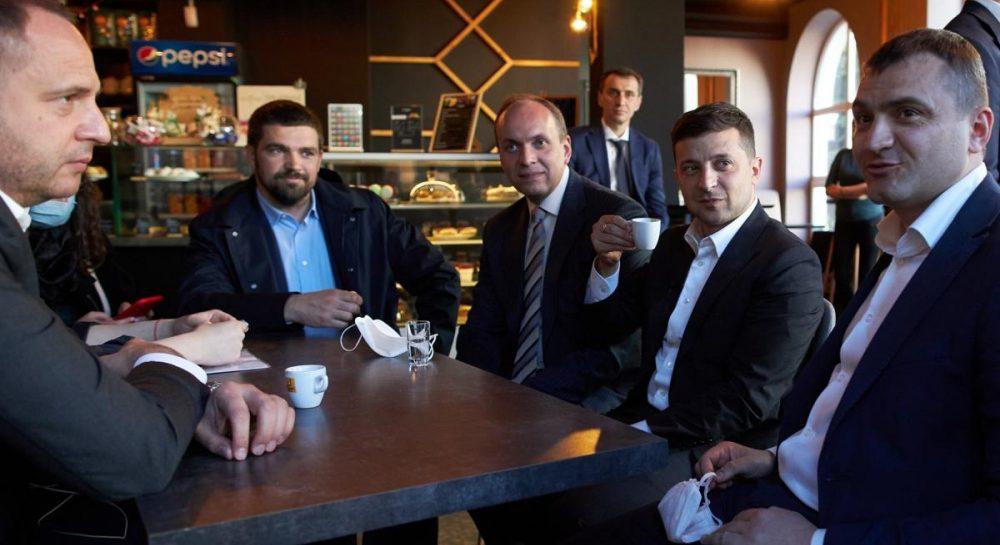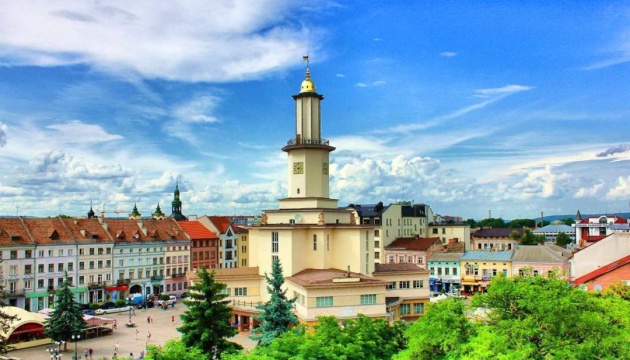Hence the unprecedented resistance of local authorities to governmental decisions took place in the background of the Corona crisis in Ukraine. Local elites claimed that government measures were neither effective nor legal. Recently, the government stepped back, allowing local municipalities to decide themselves whether schools can remain open. However, tensions remain, first of all regarding governmental policy to lock down some selected cities without compensations and relevant support for local healthcare.
Data outlining COVID-19 impact in Ukraine
From 22 May, the “adaptive quarantine” was introduced in Ukraine. The total lockdown of March-May was replaced by 4 different levels of quarantine that are introduced in Ukrainian districts depending on the data about test-confirmed cases of COVID-19 and available places in hospitals of the particular district. However, the data which defines the severity level of quarantine is manipulative or not accurate, and discriminates against municipalities, claim local authorities who refuse to shut down the local economy. They filed lawsuits against the government.
[boxright]
[/boxright]
We tried to examine the data and arguments of those questioning the expediency of applied quarantine measures.
The first clear point is lack of transparency in governmental data to determine the true level of COVID-19 impact and select relevant measures. While the number of active coronavirus cases in Ukraine is slowly but gradually growing, people are becoming less and less afraid of the virus. They start worrying more about the economic consequences of the lockdown. According to the latest sociological survey, 61% of respondents fear the economic consequences of the lockdown more than the virus itself. That is a dramatic shift since April when two-thirds of Ukrainians were worrying first of all about their and their relatives’ health.
Partially, this change of opinion may be explained by the scope of the pandemic that currently is much less ugly in Ukraine than the widely viewed images of Italian cities in March 2020. According to official data, 4,100 people died in Ukraine from COVID-19 in March-September 2020, which corresponds to 1% of all deaths in that period. This is comparable to the 3,264 and 3,276 deaths from ordinary pneumonia in March-September of 2018 and 2019. No data on pneumonia deaths in 2020 has been published so far to compare, which caused a wave of complaints to the state service of statistics.
"Without full data on mortality, no comparisons are possible. In order to draw conclusions about the justification of quarantine, which has caused significant damage to all spheres of life of Ukrainians, we need to have data on real mortality rates and their causes," said Oleksiy Ivankin, founder of Ukrainian open data service Opendatabot.
[highlight] Overall, relatively few deaths from coronavirus in Ukraine make people feel safer than they initially felt after the first media reports.[/highlight]
[boxright]
[/boxright]
At the same time, [highlight]the virus does put additional pressure on Ukrainian hospitals,[/highlight] pulling more staff and resources to take care of those requiring care. It should also be noted that [highlight]September has seen rapid growth in the number of officially reported COVID-related deaths in Ukraine[/highlight], raising the question of whether the previous highly optimistic trend will continue.
While proponents of quarantine say that it allowed to spread out the load on hospitals over time, opponents cite the Swedish scenario of no quarantine where, despite higher mortality in the first months, currently no increase in COVID-related deaths is being observed.
Irrational and illegal decisions by Kyiv undermined trust and provoked opposition of local governments
The general trust in central government was undermined in May by the aforementioned lack of open data and, most importantly, by double standards. Some measures were introduced not to impede the transmittance of infection but to psychologically influence people, artificially cause “the feeling of anxiety.”
On 9 May, Viktor Liashko, the chief state sanitary doctor of Ukraine confirmed that from the epidemiological point of view, there was no point in the closure of parks. That was done solely for its psychological effect.
"When we closed parks, sprayed roads, it was not a matter of influencing the epidemiological process as of the psychological process. After the closure of parks, there is no feeling that everything is safe, people are more psychologically ready to observe quarantine. Feelings of anxiety," the chief state sanitary doctor explained. "When I analyzed the measures that were implemented in the People's Republic of China, then in Italy…ambassadors and epidemiologists said that people do not see it, it is an invisible infection, it is necessary to create some psychological effect.”
In reality, violation of constitutional liberties, without scientific grounds and solely for psychological effects, created suspicion towards all other government measures even when they were justified.
Also, on 28 August 2020, the Constitutional Court of Ukraine ruled that quarantine was introduced with legal violations of the rights of Ukrainians such as the right to freedom of movement, the right to entrepreneurial activity, and the right to access medical care. However, the Constitutional Court of Ukraine only declared that the governmental decree was unconstitutional: it closed proceedings and didn’t move on to require the government to compensate losses incurred by businesses and citizens. This means the government can adopt any other similar decree and Ukrainian citizens will not be able to protect themselves legally. One of the judges of the Constitutional Court Oleh Pervomaiskayi claimed that in his separate opinion.

Approaching bankruptcy, Ukrainian municipalities refused to comply with the novel adaptive quarantine. Police retreated and the government had to step back
Since May, every two weeks Ukrainian districts have been assigned one of four levels of danger: green, yellow, orange, or red. The last of the four means total lockdown, including schools and all businesses with physical contact. The outrage began when three Ukrainian regional centers were marked as red. They faced demands for lockdown while the rest of Ukraine carried on working. The Mayors of Ternopil and Ivano-Frankivsk compared such a demand with the Soviet policy of dekulakization, when the richest classes of society had to close all their business and give their property to the state. And there is an element of truth in such a comparison since Ivano-Frankivsk holds first place and Ternopil fifth in the ranking of best Ukrainian cities for doing business.

After a month of stalemate, the central government retreated and officially allowed local authorities to determine themselves which of the measures they would apply. At the same time, the relevant mechanism of state compensation to local businesses and municipalities was not implemented.

Ternopil mayor Serhiy Nadal has explained in length why he is against a selective lockdown based on questionable government data:
"Didn't representatives of the central government publicly violate quarantine rules in the spring and boast about it in front of TV cameras when Ukrainians were locked up in their homes?.. Didn't the representatives of the central government later say that the ban on walking in the parks was just a 'psychological operation' against 'ignorant Ukrainians'?.. Didn't the central government spend 90% of the special coronavirus fund on government PR and road construction so that some high-ranking official could cut the ribbon? And this instead of directing these funds to [purchase] equipment for district hospitals in regions and cities.
...
What do we have in reality? All costs for countering the epidemic were borne by local communities. Equipment, medicine, surcharges for doctors - all at the expense of the local budget and philanthropists… What will happen in reality if you blindly follow the instructions of those who did not follow them? If local business stops, there will be no revenue for the local budget, we will not have the funds to maintain hospitals... Do Ukrainians have to die out?
...
It seems to me that new 'Postishevs' and 'Kaganoviches' [Soviet NKVD chiefs] have appeared in the government… They use the same methods as during the Holodomor of 1933, when the Communists surrounded the villages, taking the last crumbs of bread, seizing the means of production, and ultimately killing millions of Ukrainians because they wanted to remain Ukrainians."
Such words from the Ternopil mayor reflect what the majority of Ukrainians think. 57% of Ukrainians blame the unprofessionalism of the government for the worsening economic situation in the country, while only 26% blame coronavirus as the main cause of economic problems.

Mayor of Ivano-Frankivsk Ruslan Martsinkiv also explains how the statistics are distorted. He notes that people from surrounding settlements come for treatment to cities, raising the number of people in hospitals. At the same time, many other towns and cities artificially reduce the number of registered cases to avoid government lockdown.
Chernivtsi City Council sued the government to compensate the city for the damage caused by quarantine. According to city administration estimates, as of 16 September the level of losses lies at 140 million hryvnias ($5 million).
Trying to protect themselves against government decisions, Ukrainian cities also try to adapt to coronavirus and apply various measures themselves, including additional support to hospitals, special schedules for schools, etc. In Ternopil for example, the city council organized additional trolleybuses for the time of the quarantine that can transport children to schools for free.

If parents want their child to stay at home and study remotely over the Internet, they have that option. At the same time, parents may decide that the child will attend school and study with all children and they also should have the right to do so. That is the common practice introduced in all Ukrainian cities that refused to introduce governmentally prescribed total lockdown.
“Responsibility for the health of students (pupils) lies with their parents,” says the decision of the Ivano-Frankivsk city council that advocates a more liberal approach to coronavirus, where people define themselves what safety measures they want to apply. The same approach was applied to kindergartens.
While the officially reported COVID-19 trend deteriorates in Ukraine, the issue of rational and data-based measures, such as protection of risk groups and support for the healthcare system, including with equipment, are becoming yet more important. Also, while the government still partially continues its selective lockdown policy, without reasonable arguments and transparent statistics, it only loses the remnants of public trust.
Read also:
- Interactive COVID-19: Ukraine and world
- Ukraine is gathering personal data to combat COVID-19. How safe is that?
- Travel to Ukraine online — a tourist guide for quarantine times
- Third recession in ten years — the impact of COVID-19 lockdown on Ukraine’s economy
- Ukrainian volunteers step in to protect medical workers fighting COVID-19 where state fails
- Art lovers recreate Ukrainian masterpieces in COVID-19 confinement





